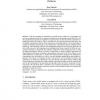94 search results - page 5 / 19 » Principles of remote attestation |
JCP
2008
13 years 7 months ago
2008
Trusted computing platforms have been proposed as a promising approach to enhance the security of general-purpose computing systems. Direct Anonymous Attestation(DAA) is a scheme t...
JUCS
2010
13 years 2 months ago
2010
: One of the most important use-cases of Trusted Computing is Remote Attestation. It allows platforms to get a trustworthy proof of the loaded software and current configuration of...
DCOSS
2008
Springer
13 years 9 months ago
2008
Springer
Abstract. This paper presents a protocol called SAKE (Software Attestation for Key Establishment), for establishing a shared key between any two neighboring nodes of a sensor netwo...
WPES
2005
ACM
14 years 1 months ago
2005
ACM
Radio Frequency Identification (RFID) technology raises significant privacy issues because it enables tracking of items and people possibly without their knowledge or consent. O...
JUCS
2010
13 years 5 months ago
2010
: With the spreading of embedded and mobile devices, public-key cryptography has become an important feature for securing communication and protecting personal data. However, the c...

